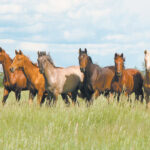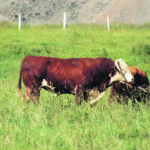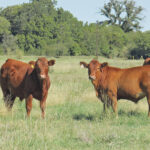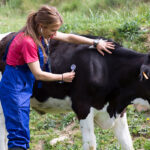When I graduated from the Western College of Veterinary Medicine in 2010, there were only a handful of advertised jobs. I was hired by a rural practice near Calgary through a lucky word-of-mouth connection—vet positions in this area were in short supply. Times have changed. Now veterinary professional publications feature pages of vet wanted ads, […] Read more
Tag Archives animal health — page 17

Antimicrobial resistance can cause problems in horses
The COVID-19 pandemic is likely to go down in history as the defining public health event of our lifetime. The issue of antimicrobial resistance will too, albeit it will be remembered as more of a slow burn rather than an explosive event. Bacteria resistant to antimicrobial drugs have been around since the first of these […] Read more

Pet owners are often best to decide when to euthanize
He inhaled his last breath, went limp in my arms and was gone. Deciding to euthanize my cat, Tomba, was a difficult decision. He warmed my lap while I studied for every exam during my four years of veterinary school. It was his joints I manipulated to learn anatomy and his eyes I stared into […] Read more

Vet lab pioneers receive high honour
Couple named to Alberta Order of Excellence established Western Canada’s only animal pharmaceutical operation
A call from Alberta lieutenant-governor Salma Lakhani came as a shock to Merle and Barbara Olson, who were recently named to the Alberta Order of Excellence. The two Alberta veterinarians were recognized for their expertise and international renown in the fields of toxicology, as well as their work on veterinary products that address animal health […] Read more
New study explores West Nile cases in Canadian horses
A 2021 study by Antoine Levasseur and colleagues published in the Canadian Veterinary Journal analyzed cases of West Nile virus infection in horses across the country. The study included cases starting in 2003 when the disease was designated as an immediately notifiable disease. From 2003-19 there were 842 cases of this disease in horses reported […] Read more

PED shone light on importance of feed import controls
Before the COVID-19 pandemic, another coronavirus was wreaking havoc in North America, only this one was attacking pigs. This coronavirus causes porcine epidemic diarrhea, a severe disease in which pigs go off feed, vomit, have diarrhea and often die. The virus is shed in large volumes in the feces and other pigs become infected when […] Read more

Trichomoniasis is a tricky illness to manage
Testing methods have improved for this sexually transmitted disease, making it easier for producers to keep it at bay
Trichomoniasis, a sexually transmitted disease, can sneak into a herd without obvious signs until cows don’t conceive and the calf crop is reduced. It is caused by protozoa in the reproductive tract of cows and the sheath of bulls and occurs most often when ranchers use untested bulls, buy open cows or when cattle herds […] Read more
Bucking horse research finds that handler behaviour matters
Over the years I’ve spent as a competitor and observer of rodeos, it seemed evident that the mature campaigner broncs were generally calm, loaded well into the chutes and stood for their equipment and rider, while the green stock were more likely to balk, head toss and kick. New research from the University of Calgary’s […] Read more

Space, cleanliness can help prevent coccidiosis
Coccidiosis is an intestinal infection caused by protozoa and usually affects calves rather than adult cattle. The pathogens are ingested by calves in a contaminated environment. Most adult cattle have encountered these protozoa at some point during their lifetime and have developed some immunity, but may continue to shed a few oocysts (the “eggs” of […] Read more

Veterinary pathologist observes 50 years of changes
This June, animal health professionals gathered for the Canadian Animal Health Laboratorians Network meeting. Like many things in 2020, the in-person conference was cancelled due to the COVID-19 pandemic. Instead, the University of Calgary Faculty of Veterinary Medicine hosted the meeting in a virtual format. The organization includes people from a range of laboratory specialties […] Read more






